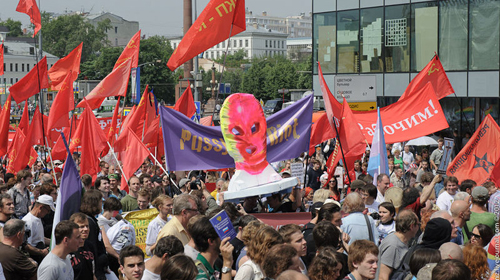
In the last few months, concerned American celebrities, musicians and activists have joined protesters abroad to demonstrate their support for a Russian feminist collective, Pussy Riot. Following a peaceful performance in MoscowтАЩs Christ the Savior Cathedral, in which the group publicly criticized President Vladimir Putin, the three women were arrested, jailed, prosecuted and ultimately sentenced to two years in jail for тАЬhooliganism driven by religious hatred.тАЭ Celebrities and musicians, including Madonna, Sting, Paul McCartney, Chloe Sevigny, Moby and Bjork, have all enthusiastically declared their opposition to the prosecution, conviction and sentencing of Pussy Riot. Across social media outlets, Americans are imploring their readers and friends: Free Pussy Riot! With this moment comes an opportunity to dissect what exactly it is that has animated so many Americans and dominated a significant strand of the Western mediaтАЩs attention.
After last weekтАЩs sentencing, the clamor of outrage reached a fever pitch. ItтАЩs not surprising that such a harsh response to a peaceful protest would resonate with Americans, particularly in the face of the impending one-year anniversary of Occupy Wall Street. In the past year, American protesters have been subjected to heightened state surveillance, unlawful arrests and excessive force by police. Now, Pussy Riot solidarity protests have emerged across the country. In part, this solidarity seems to be born of the fear that American free speech is next in line at the guillotine тАУ , тАЬIf weтАЩre not careful, that might happen here.тАЭ
The members of Pussy Riot absolutely deserve recognition for their willingness to critique the policies and practices of their government. In addition, their actions have served to educate the wider world about the Russian governmentтАЩs haste to . Many Americans are rightfully disturbed by the notion that a nonviolent proclamation of anti-state sentiment could result in long-term incarcerationтАФat hard labor no less. On its surface, this prosecution strikes an obvious chord тАУ the Russian judicial systemтАЩs treatment of Pussy Riot embodies a violation of a fundamental characteristic of American identity and politics. But the ease with which the media has venerated these activists is about more than our rightfully cherished freedom of speech тАУ , the desire to portray them as harmless тАЬdamsels in distressтАЭ is dominant in the mediaтАЩs coverage of Pussy RiotтАЩs prosecution. In this instance of media frenzy, it seems being white and female has aided the ease with which American celebrities and the Western media have taken to Pussy RiotтАЩs cause.
Harsh sentencing in the face of acts that can scarcely be considered criminal shouldnтАЩt be a novel concept to Americans, or to the Western media. Just last week, we wrote about the shameful and disturbing trend toward extreme sentencing in jurisdictions around this country. Right here in our own backyard, you can get a 70-year sentence for stealing a tuna sandwich if you have prior convictions, and a first time drug offense can lead to life in prison. Unpaid legal debts regularly land poor Americans in jail. But these absurd and inhumane sentences arenтАЩt often handed down to white women, and they lack the glamour of political dissidents dressed in colorful headgear. For many American protestors, the color of their skin all but guarantees that they are unlikely to be prosecuted for petty, low-level crimes, making free speech a more accessible battlefield.
In a public statement, Pussy RiotтАЩs two-year sentence as тАЬtoo harsh andтАжinhumane,тАЭ calling on тАЬall those who love freedom to condemn this unjust punishment.тАЭ Such language is often used to criticize the harsh and unjust punishments faced by thousands of poor people, especially people of color, who are funneled into the American criminal justice system every year. But the parallel ends there, and the media frenzy for these folks is practically nonexistent. Perhaps this is because тАЬCease the needless mass incarceration of poor people of colorтАЭ just wouldnтАЩt fit as neatly on as тАЬFree Pussy RiotтАЭ did.
In a just world, no one would be prosecuted or jailed for peaceful protest or for exercising their right to free speech, and until that world exists, it is vital that people everywhere speak up for those whose governments will not let them. But the work cannot end there. For all those who are so readily agitated by Pussy RiotтАЩs unwarranted two-year sentence and eager to protest, there is good news: there is more than enough injustice to go around, and help is needed. Imagine if we could harness just a fraction of the attention and enthusiasm paid to causes like Pussy Riot, and channel it into our own broken criminal justice system. It is well-known that the United States leads the world with its massive incarceration rate тАУ Russia comes in third. Should the Pussy Riot frenzy fade, letтАЩs not forget to extend our defense of and enthusiasm for freedom to all those who need it тАУ including those who languish behind bars here at home.
Learn more about overincarceration: Sign up for breaking news alerts, , and .


